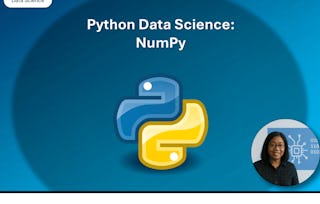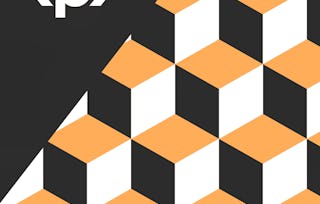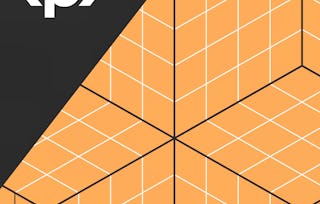Become proficient in NumPy, a fundamental Python package crucial for careers in data science. This comprehensive course is tailored to novice programmers aspiring to become data scientists, software developers, data analysts, machine learning engineers, data engineers, or database administrators.

Data Science with NumPy, Sets, and Dictionaries

Data Science with NumPy, Sets, and Dictionaries
This course is part of Programming for Python Data Science: Principles to Practice Specialization



Instructors: Genevieve M. Lipp
2,858 already enrolled
Included with
20 reviews
Recommended experience
Skills you'll gain
Details to know

Add to your LinkedIn profile
1 quiz, 3 assignments
See how employees at top companies are mastering in-demand skills

Build your subject-matter expertise
- Learn new concepts from industry experts
- Gain a foundational understanding of a subject or tool
- Develop job-relevant skills with hands-on projects
- Earn a shareable career certificate

There are 4 modules in this course
This module, you will learn the basics of object oriented programming as well as how to use sets and dictionaries to store and work with data in Python. You will apply these concepts with Python to perform some mathematical operations and analytical tasks, including solving geometric problems with circles and counting words in a document.
What's included
10 videos5 readings4 programming assignments
This module, you will learn how to utilize NumPy--one of the most useful Python packages we use in data science--as well as learn additional data structures, arrays, beginning with the simplest type of an array, a vector. With NumPy and your new understanding of vectors, you will develop histograms as well as analyze household income distribution data in the United States, drawing your own data-driven conclusions.
What's included
1 video9 readings2 assignments3 ungraded labs
This module, you will first learn how NumPy handles data in your program using views and copies of your data. You will then learn how to work with more complex arrays called matrices, as well as how you can subset, filter, and modify data in matrices. Finally, you will write your own programs to manipulate data matrices and report your results for a given dataset.
What's included
1 video14 readings1 quiz3 ungraded labs
In this module, you will learn how to use NumPy to summarize data from matrices (e.g., calculating averages, minimums, maximums, etc.) as well as how to begin to analyze and manipulate image data. You will also explore two new data science techniques: how to make your analysis of data matrices more computationally efficient (vectorization) and how to randomize data (randomization).
What's included
1 video12 readings1 assignment2 ungraded labs
Earn a career certificate
Add this credential to your LinkedIn profile, resume, or CV. Share it on social media and in your performance review.
Instructors

Offered by
Explore more from Data Analysis
 Status: Free Trial
Status: Free TrialLogical Operations
 Status: Free Trial
Status: Free TrialUniversity of Michigan
 Status: Free Trial
Status: Free Trial
Why people choose Coursera for their career

Felipe M.

Jennifer J.

Larry W.

Chaitanya A.
Learner reviews
- 5 stars
55%
- 4 stars
20%
- 3 stars
5%
- 2 stars
5%
- 1 star
15%
Showing 3 of 20
Reviewed on Aug 16, 2025
The course was really very interesting and Was very Useful and The concepts was clear with Implementation

Open new doors with Coursera Plus
Unlimited access to 10,000+ world-class courses, hands-on projects, and job-ready certificate programs - all included in your subscription
Advance your career with an online degree
Earn a degree from world-class universities - 100% online
Join over 3,400 global companies that choose Coursera for Business
Upskill your employees to excel in the digital economy
Frequently asked questions
To access the course materials, assignments and to earn a Certificate, you will need to purchase the Certificate experience when you enroll in a course. You can try a Free Trial instead, or apply for Financial Aid. The course may offer 'Full Course, No Certificate' instead. This option lets you see all course materials, submit required assessments, and get a final grade. This also means that you will not be able to purchase a Certificate experience.
When you enroll in the course, you get access to all of the courses in the Specialization, and you earn a certificate when you complete the work. Your electronic Certificate will be added to your Accomplishments page - from there, you can print your Certificate or add it to your LinkedIn profile.
Yes. In select learning programs, you can apply for financial aid or a scholarship if you can’t afford the enrollment fee. If fin aid or scholarship is available for your learning program selection, you’ll find a link to apply on the description page.
More questions
Financial aid available,



